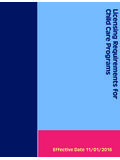Transcription of MINIMUM LICENSING TRAINING REQUIREMENTS CHILD ... …
1 MINIMUM LICENSING TRAINING REQUIREMENTS . CHILD PLACING AGENCIES. Similar REQUIREMENTS for Residential Facilities October 8, 2014. PRE-SERVICE TRAINING REQUIREMENTS . Must Be Completed Before the Person Can be the Only Caregiver for the CHILD BASIC SERVICE LEVEL : CHILD is capable of responding to limit-setting or other interventions General Pre-Service TRAINING 8 hours (specific topics must be covered). Emergency Behavior Interventions 8 hours (specific topics must be covered). CPR/1st Aid 2-5 hours (course completion). Trauma Informed 2 hours ( LICENSING effective date 12/1/2014; effective now in contracts). Psychotropic Medications 2 hour (Online TRAINING contracts; LICENSING requires mastery of topics). Total Cumulative Hours 22 25 hours THERAPEUTIC SERVICE LEVELS (Moderate to Intense): Moderate risk to imminent danger of harm to self or others General Pre-Service TRAINING 8 hours (specific topics must be covered).
2 Emergency Behavior Interventions 16 hours (specific topics must be covered). CPS/1st Aid 2-5 hours (course completion). Trauma Informed 2 hours ( LICENSING effective date 12/1/2014; effective now contracts). Psychotropic Medications 2 hour (Online TRAINING contracts; LICENSING requires mastery of topics). Total Cumulative Hours 30-33 hours Adjustments Possible to Cumulative Hours Required trainings can be incorporated into the General Pre-Service TRAINING (reducing the cumulative hours somewhat). This is dif- ficult to accomplish, however, and ensure all required general pre-service topics are covered including: identification and treatment of abuse/neglect; developmental stages, constructive guidance/discipline, fostering self-esteem, monitoring children; communica- ble diseases; and emergency procedures. Psychotropic medication TRAINING required for those who administer medications.
3 Direct Supervision Required for Caregivers of Specialized and Intense Children DFPS contracts requires that new caregivers may not have sole responsibility for specialized or intense children until they have been supervised for 40 hours while conducting direct CHILD -care duties. Additional Orientation and Young CHILD TRAINING Required Orientation TRAINING required on organizational structure, policies, and rules (not part of pre-service; hours determined by CPA). Additional pre-service TRAINING required if caring for children younger than two. ANNUAL TRAINING REQUIREMENTS . Must Be Completed within One Year of Employment and Annually Thereafter BASIC SERVICES CHILD THERAPEUTIC SERVICES CHILD . 20 Hours per Family Unit , including: 50 Hours per Family Unit - LICENSING ; 30 hours per caregiver OR. 60 per unit DFPS contracts, including: Behavior intervention TRAINING ; Behavior intervention TRAINING .
4 Two hours trauma informed TRAINING ; Two hours trauma informed TRAINING ;. Psychotropic Medications if administered Psychotropic Medications if administered CPR/1st Aid kept current CPR/1st Aid kept current 2 hours transportation safety for group homes prior to 2 hours on transportation safety for group homes prior to transporting children under nine. transporting children under nine. How does LICENSING Ensure Quality Pre-Service and Annual TRAINING ? LICENSING requires the CPA or Residential Operation to ensure that caregivers receive TRAINING relevant to the popula- tion of children they serve. LICENSING does not approve TRAINING resources, but requires that each TRAINING include: Learning objectives;. A curriculum including experiential and applied activities;. An evaluation/assessment tool to determine whether the person has obtained the information necessary to meet the stated objectives; and A certificate, letter, or signed statement of successful completion from the TRAINING course.
5 In addition, a qualified instructor must lead the TRAINING , with specific topics listed for inclusion in pre-service and an- nual TRAINING ; and emergency intervention, psychotropic medication, and transportation TRAINING . What is the Benefit of Allowing Providers to Select their TRAINING Curriculum? Texas is a vast, geographically diverse state that is not best served by a one size for all model. Simply put, what works in Del Rio does not always work in Dallas. In developing a curriculum, agencies can tailor trainings to address identified needs in their programs as well as address cultural and community needs in their part of the state. A standardized curriculum would limit innovation and development of new curriculums. Innovations are critical given the lack of evidence based curriculums for foster care. They allow treatment options to advance as agencies incorporate new best practice models into their TRAINING .
6 There is not one evidence-based comprehensive model for TRAINING foster parents right now. There are however, several evidence supported trauma informed trainings that can be tailored to an agency's program. By not pre- scribing a mandatory curriculum, agencies can apply practice wisdom and experience-based learning in building their TRAINING programs. What are Examples of Evidenced Supported Trainings Used by Providers in Texas? There are a number of evidence supported trainings used by different agencies. The selection of a particular TRAINING depends on a number of factors including: the rural or urban surroundings, and cultural / ethic makeup of the commu- nity, and available community resources and supports. Some of the trauma informed models include: Trauma Focused Cognitive Behavior Therapy (TF-CBT). Parent CHILD Interactive Therapy (PCIT). Attachment Regulation Competency (ARC).
7 Trauma Systems Therapy (TST). Neurosequential Model of Therapeutics Sanctuary Model What is the Role of Pre-Service versus Annual TRAINING ? Pre-service TRAINING is necessary to ensure foster families and employees are prepared to accept a CHILD into their home or facility. LICENSING specifies a comprehensive list of topics to include in pre-service TRAINING to ensure all the critical areas are addressed; however, it is the transfer and sustainability of TRAINING after the CHILD is in care that is critical. Annual TRAINING is how agencies ensure that the necessary knowledge is learned and practiced by families. Foster fami- lies indicate they learn a great deal about what they need once they have children in care. Follow up and observation in the field by the CPA caseworker is critical. Agencies identify areas that need more TRAINING through this evaluation process and continuously update their annual TRAINING to address what they learn through supervision and support.
8 The latest evidence based practices are incorporated in annual trainings which are often occur throughout the year. TEXAS ALLIANCE OF CHILD AND FAMILY SERVICES. The Texas Alliance of CHILD and Family Services is a 40-year old nonprofit membership organization representing private organiza- tions across Texas that provide the full array of direct services to children in DFPS care. The Alliance has 63 members and most op- erate multiple sites throughout the state. Contact: Nancy Holman, Executive Director - 409 West 13th St. Austin, Tx; Email: Phone: 512/773-8923.




